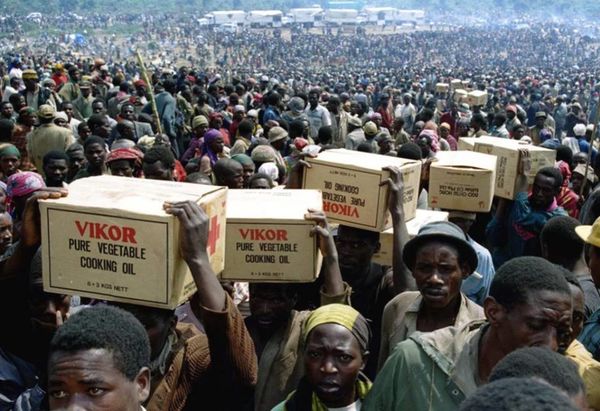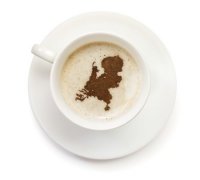Introduction to the origin of coffee-"Rwanda, Burundi" of the African Department

For professional baristas, please follow the coffee workshop (Wechat official account cafe_style)
Today we will introduce the five countries of East Africa, and then introduce the coffee of the five countries of East Africa individually.
In 2015, five "East African Communities", including Kenya, Tanzania, Burundi, Rwanda and Uganda, proposed that five countries should be merged into a federal state.
Use a common constitution, president, parliament and currency.
The reunification of the five countries is a political issue. From the point of view of the media, there is no particularly absolute civil "support for reunification" or "support for independence".
The issue of the reunification of the East African Community also does not have a sense of aggression, so the discussion on the topic is mostly peaceful.
Each briefly introduces the background of the five countries.
It is only in the past two years that Kenya rioted because of differences in elections, in which national consciousness involving political relations is the main factor of unrest.
Kenyan coffee is also the most important in the coffee history of the five countries. Its berries, sour, sweet and healthy are represented by Kenyan coffee, which is particularly popular in the UK.
Tanzania has no ethnic or political struggle, and its political and economic development is relatively stable. In addition, at present, many garment factories in Taiwan have also chosen to set up factories in Tanzania, and more and more people here can also speak Chinese.
However, the lack of fighting incidents also highlights the problems of witchcraft, superstition and elephant overhunting. Tanzanian coffee is quite similar to Kenya, and even the grading system is based on the same concept. But in general, the aromas of flowers and berries are slightly faded, but they have a thick and persistent sweet aroma.
Rwanda is a country that is closer to the information we have, perhaps because their history is too shocking, and then there are important deeds of cooperation with Starbucks.
At the same time, Rwanda also attaches great importance to women's rights and interests. Rwandan coffee has a similar smell to Yega Xuefei, so it has attracted a great deal of international attention. Maybe Rwanda is about to become a world-famous successor to Yega Xuefei.
Burundi's presidential and parliamentary elections have been delayed as the incumbent president intends to run for a third term.
Burundi and Rwanda are very similar in terms of ethnic and political background, women's issues and even the flavor of coffee.
Uganda is known as the Pearl of Africa. A unified economic market was established in 2010 and is also the major country that intends to promote the reunification of the five countries this year.
The country was rated by Transparency International as one of the most corrupt governments, with a score of 2.2 out of 10. Ugandan coffee is not common in Taiwan, but its sticky and sweet taste is still popular in the hands of several domestic baked beans, and it has become an irreplaceable brand with Italian formula.
Let's first introduce Rwanda.
In the Belgian colonial era, there was a policy of separating the people from the law.
In 1962, Rwanda became independent, with the Hutu in power, and continued the so-called ethnic separation under this policy.
The Rwandan Patriotic Front, made up of Tutsi, waged a civil war with Hutu government forces.
The Patriotic Front is supported by Uganda and the government forces are backed by France, which further aggravates the confrontation between the two sides.
Encouraged by the media controlled by the government, the Hutu people began to be fascinated by the ideology of "Hutu power", contributing to an atmosphere of racial inequality.
Finally, in 1993, the President of Rwanda signed a ceasefire agreement under international pressure, bringing the civil war to an end.
In April 1994, the President of Rwanda was assassinated, thus leading to a massacre in Rwanda that shocked the world.
Regardless of race, people with different positions were almost annihilated by the Hutu.
The cease-fire immediately stopped and the Patriotic Front of the North began to attack the south, eventually defeating the government forces.
Some 2 million Hutu fled Rwanda and became refugees for fear of Tutsi reprisals.
More than 1 million people died within three months, accounting for 20% of the population at that time.
Of the 1 million deaths, murderers are estimated to be about 100, 000, but only 40, 000 to 50, 000 are actually in prison.
Among them, countless women were infected with AIDS during the war.
After the massacre, known as the civil war, Rwanda's economy was hit hard.
Rwanda mainly relies on agricultural exports to support its economy, but they are all cash crops, so the food problem has always failed to catch up with population growth.
As of 2010, although the Rwandan economy has grown steadily, many families still have to grow their own vegetables to make ends meet.
In the sixteen years of the massacre, Starbucks recognized the quality of coffee in Rwanda and became one of the important countries in which Starbucks pursued the purpose of "fair trade".
In addition, the "Rwanda Ambarkanda Cooperative", which I have baked, is also a coffee production organization made up of local women's associations, and it has also been praised by Fair Trade.
Step by step, Rwanda is carefully emerging from the slaughter and growing between livelihood and rights. This is a country worth falling in love with.
In recent years, Rwanda has been gradually recognized as a safe and secure tourist destination, which has led to the rapid growth of tourism in Rwanda.
Rwanda is one of the only two countries in the world where mountain gorillas can be seen, and other primates and savanna reserves are selling points worth visiting abroad.
1607071_1624860287771716_3002710235190250220_n
Burundi.
In the 16th century, there was a feudal kingdom called Wulongdi.
The kingdom of Wulongdi was conquered by Germany in 1890.
In 1916, it fell under the control of the Belgian army.
During World War I, the League of Nations assigned Rwanda and Wulongdi, which were merged at that time, to Belgium, which supported the local royal family to rule the region, and this was the beginning of Hutu power.
After the end of World War II, Rwanda and Wulongdi became United Nations trusteeship territories, entrusted by Belgium.
In 1959, Oolong was separated from Rwanda. It became independent on July 1, 1962 and changed its name to the Kingdom of Burundi.
It was during this period that Rwanda declared its independence, thus launching two countries with different futures but equal fruits.
In 1966, the prime minister of military origin dismissed the original prince, changed the Kingdom of Burundi into a "Republic of Burundi" and entered a period of military dictatorship.
Burundi is made up of Tutsi and Hutu. The Tutsi account for only 15%, but they are in charge. There are also a small number of aboriginal Tewa people. This is a very abnormal social structure.
In October 1993, only four months after taking office, the first Hutu head of state and the first democratically elected president of Burundi was assassinated by Tutsi-controlled forces, leading to a full-blown ethnic conflict.
About 200000 people were slaughtered in the conflict.
It was not until 2002 that the Tutsi government, under international mediation, finally signed an armistice with four Hutu rebels, even today.
As the current president of Burundi has always had a dispute over electoral fraud, it has caused a wide range of disputes when the other side wants to run for the third president.
Many observers believe that Burundi is likely to follow in the footsteps of Burkina Faso, where the president was overthrown in an attempt to extend his term of office.
Therefore, the future of Burundi will be a year full of turning points this year.
The historical development process of the two countries is almost based on the same SOP.
A little additional information indicates that the above-mentioned Rwanda and Oolong were assigned to Belgium by the League of Nations during World War I.
The League of Nations, an international organization formed after the signing of the Treaty of Versailles, existed probably after World War I and shortly after the end of World War II.
The aim is to reduce the number of weapons, quell international disputes and maintain people's livelihood. However, due to the lack of force in the League of Nations and the need for assistance from various countries, there is often a gap between resolution and implementation, which can not prevent the outbreak of fascism and World War II at that time.
So after the end of World War II, the role of the League of Nations was replaced by the present-day United Nations.
As for the Treaty of Versailles, it was the main contract for the cease-fire negotiations between the two sides in World War I.
After six months of negotiations with the president in Paris, the treaty was signed on June 28, 1919, marking the end of World War I.
Important Notice :
前街咖啡 FrontStreet Coffee has moved to new addredd:
FrontStreet Coffee Address: 315,Donghua East Road,GuangZhou
Tel:020 38364473
- Prev

Introduction to the producing area of Coffee-Ethiopia in Africa
For professional baristas, please follow the coffee workshop (Wechat official account cafe_style) Ethiopia is the birthplace of coffee, which can start directly from the history of drinking. In 850, a shepherd in Ethiopia found that his goat became energetic after eating a certain fruit. When a group of hating couples learned that they ate it but felt very bitter and disappointed, they threw the picked fruit into
- Next

Why is it called Golden Manning the name comes from the description of the characteristics and Flavor of Ateng Coffee Bean
For the exchange of professional baristas, please pay attention to the coffee workshop (Wechat official account cafe_style) Mantenin is not the name of the producing area, the place name, the port name, nor the name of the coffee variety, but how its name originated from the phonetic mispronunciation of the mandheling people in Mandaining, Indonesia. Manning coffee is on the second.
Related
- Detailed explanation of Jadeite planting Land in Panamanian Jadeite Manor introduction to the grading system of Jadeite competitive bidding, Red bid, Green bid and Rose Summer
- Story of Coffee planting in Brenka region of Costa Rica Stonehenge Manor anaerobic heavy honey treatment of flavor mouth
- What's on the barrel of Blue Mountain Coffee beans?
- Can American coffee also pull flowers? How to use hot American style to pull out a good-looking pattern?
- Can you make a cold extract with coffee beans? What is the right proportion for cold-extracted coffee formula?
- Indonesian PWN Gold Mandrine Coffee Origin Features Flavor How to Chong? Mandolin coffee is American.
- A brief introduction to the flavor characteristics of Brazilian yellow bourbon coffee beans
- What is the effect of different water quality on the flavor of cold-extracted coffee? What kind of water is best for brewing coffee?
- Why do you think of Rose Summer whenever you mention Panamanian coffee?
- Introduction to the characteristics of authentic blue mountain coffee bean producing areas? What is the CIB Coffee Authority in Jamaica?

